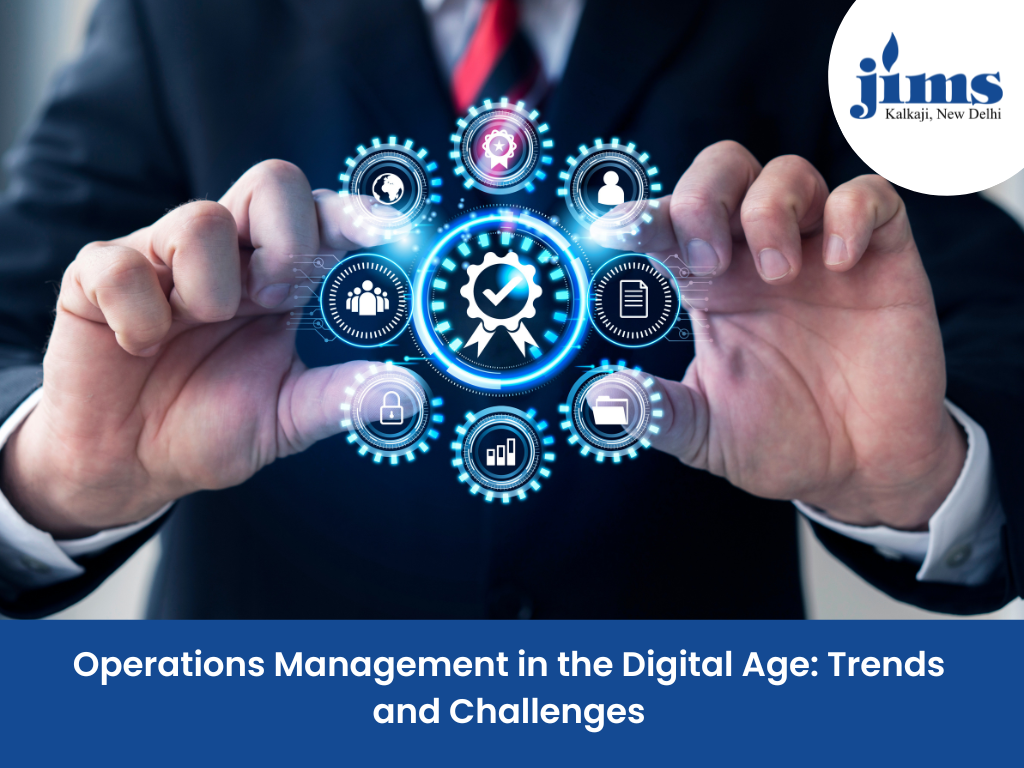Operations management is the cornerstone of any organization’s success. It’s the art and science of designing, controlling, and improving the processes and systems that transform inputs into products and services. In today’s fast-paced and technology-driven world, the landscape of operations management is rapidly evolving. This article explores the trends and challenges in operations management in the digital age, with a particular focus on the role of JIMS Kalkaji, one of the top MBA college in Delhi in preparing the next generation of operations leaders.
The Digital Transformation of Operations Management
The digital age has brought about a paradigm shift in how organizations manage their operations. The integration of technology and data-driven decision-making has ushered in a new era of efficiency, agility, and competitiveness. Here are some key trends that define operations management in the digital age:
-
Data Analytics and Big Data:
Operations management now relies heavily on data analytics and big data. The ability to collect and analyze vast amounts of data allows organizations to make informed decisions, optimize processes, and predict future trends.
-
IoT (Internet of Things):
The IoT has enabled the interconnectivity of devices and systems. This connectivity allows for real-time monitoring and control of operations. For example, in manufacturing, sensors on machines can provide data on their performance, enabling predictive maintenance and reducing downtime.
-
Automation and Robotics:
Automation technologies and robotics have revolutionized operations, particularly in manufacturing and logistics. Robots can perform tasks with precision and consistency, reducing the need for human intervention in routine processes.
-
Supply Chain Digitization:
Digital supply chain management optimizes the flow of goods, information, and finances across the entire supply chain. This leads to enhanced visibility, reduced costs, and improved responsiveness to market changes.
-
Cloud Computing:
The cloud provides scalable and cost-effective solutions for managing operations. It enables remote access to data and applications, making operations management more flexible and efficient.
-
Lean and Agile Principles:
Lean and agile methodologies have become even more relevant in the digital age. These principles emphasize minimizing waste and enhancing adaptability, aligning well with the demands of the modern business environment.
-
Sustainability and Green Operations:
Sustainability is a growing concern for organizations. Digital tools and technologies are used to monitor and reduce environmental impact, leading to more sustainable and eco-friendly operations.
Challenges in Operations Management
While the digital age has brought many advantages, it has also given rise to several challenges in operations management:
-
Cybersecurity Risks:
As operations become increasingly digital, the risk of cybersecurity threats grows. Protecting sensitive data and maintaining the security of digital operations is a major challenge.
-
Talent Shortage:
The rapid adoption of technology has created a shortage of skilled professionals who can effectively manage and leverage digital tools in operations.
-
Integration Complexity:
Integrating various digital systems and technologies can be complex and costly. Organizations must ensure that these systems work seamlessly together.
-
Data Management:
Handling vast amounts of data and ensuring data quality and accuracy can be overwhelming. Effective data management is critical for informed decision-making.
-
Change Management:
Digital transformations often require cultural shifts within organizations. Change management is necessary to ensure that employees adapt to new processes and technologies.
-
Regulatory Compliance:
Adhering to regulatory requirements, especially in industries like healthcare and finance, can be challenging when dealing with digital operations.
The Role of Education in Navigating Digital Operations
To address these trends and challenges, many professionals and aspiring leaders turn to higher education. Pursuing an MBA program can provide individuals with the skills and knowledge needed to navigate the complexities of operations management in the digital age. When considering an MBA program in Delhi, top institution such as JIMS Kalkaji, are known for their comprehensive and relevant curriculum.
JIMS Kalkaji: Preparing Future Operations Leaders
Jagannath International Management School, Kalkaji (JIMS Kalkaji), is one of the leading institutions in Delhi offering MBA programs with a strong focus on operations management. The institute’s commitment to quality education and a conducive learning environment has made it a preferred choice for aspiring business leaders.
-
Industry Integration:
JIMS Kalkaji maintains strong connections with the corporate world. It frequently invites industry experts and experienced operations managers for guest lectures, ensuring that students are exposed to real-life insights and best practices in operations management.
-
Operations Management Workshops:
The institute organizes operations management workshops that simulate real-world scenarios. These hands-on experiences allow students to apply their knowledge and develop practical skills in operations management.
Operations Management at JIMS Kalkaji
Operations management is a key focus area at JIMS Kalkaji. We believe in providing students with a holistic understanding of the subject, covering various aspects:
-
Supply Chain Management:
Students are exposed to the intricacies of supply chain management, which is central to efficient operations. This includes procurement, logistics, and distribution.
-
Process Optimization:
JIMS Kalkaji emphasizes process optimization, helping students identify areas for improvement and efficiency in various operational processes.
-
Lean Management:
Lean principles, which focus on minimizing waste and maximizing value, are integrated into the curriculum to enhance efficiency.
Strategic Operations Management:
Students learn to align operations with an organization’s overall strategic objectives, ensuring that operations contribute to the achievement of business goals.
Conclusion
The digital age has reshaped operations management, presenting both exciting opportunities and complex challenges. Professionals and aspiring leaders in this field need to adapt to the changing landscape, and education plays a pivotal role in this adaptation. Pursuing an MBA program in Delhi, particularly at JIMS Kalkaji, equips individuals with the knowledge and practical skills needed to excel in operations management in the digital age. As businesses continue to evolve and embrace digital transformation, the role of operations managers will remain crucial in driving efficiency, innovation, and competitiveness.

